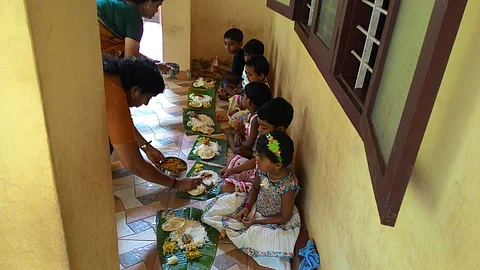

Kondagaon, a small tribal-dominated and Naxal-affected district in Chhattisgarh's Bastar division, has recorded more than 40 per cent decline in the number of malnourished children in the last two years even as it is also tackling the COVID-19 pandemic since last year, an official claimed on Sunday.
Besides, a project, titled 'Nangat Pila', (term coined in local 'Halbi' dialect which means a healthy child), launched last year has not only helped in curbing malnutrition, but also provided a new source of livelihood to women and their self-help groups (SHGs) in the district.
Located over 200 km from the state capital Raipur, Kondagaon, which has often been in news due to Naxal violence, is now showing how a systematic approach can help in fighting malnutrition along with creating avenues of livelihood.
The efforts made as part of the anti-malnutrition drive in the district resulted in bringing down the numbers of malnourished children from 19,572 in 2019 to 11,440 in July this year, Kondgaon Collector Pushpendra Kumar Meena told PTI.
The credit for this 41.54 per cent decline in the cases goes to different departments, particularly workers of the anganwadis (government-run women and child care centres), he said. The district, having a population of around six lakh, comprises 1,827 anganwadi centres.
In October 2019, the district administration started the work in this direction with the launch of the 'Mukhyamantri Suposhan Abhiyan', a flagship scheme of the Chhattisgarh Congress government, aimed at eradicating malnutrition from the state.
However, what added to our concern was the outbreak of COVID-19 in March last year, leading to long lockdown periods. The anganwadi workers, who are considered as the backbone in the fight against malnutrition, had to fight another battle, the Coronavirus pandemic, the collector said.
But, the anganwadi workers served their twin responsibilities and along with spreading awareness about the Coronavirus and facilitating tests of people residing in rural areas, they also ensured the reach of nutritious food to children even in remote and Naxal-affected areas of the district, he said.
Till Saturday, the district had recorded 13,104 cases of COVID-19, including 99 deaths. It has 14 active cases as of now, while 12,991 people have recovered from the infection, as per official data. To add impetus to the 'Suposhan Abhiyan' during the pandemic, the district administration in June last year launched the 'Nangat Pila' project, the collector said.
As part of the drive, children of different age groups are served eggs, sprouts, jaggery, chickpeas, lentils, rice, vegetables and pickles in their diet. Under the new project, the district administration also decided to include Kodo, a nutrition-rich millet, in the diet of children and ensure sufficient availability of eggs.
"For the purpose, we decided to procure millets from local tribals, who cultivate these small cereal crops in the interior parts, and eggs from SHGs, thereby creating sources of livelihood for them," the IAS officer said. The district administration then facilitated setting up of a women farmers' producer company, named 'Udan', run and managed by SHGs, at the Kondagaon district headquarters for processing millets and other produce.
Besides, a poultry farm was also established in Kukadgarkipaal panchayat with a production capacity of 4,000 eggs per day for this company, he said. Eggs from this poultry farm are transported to the 'Udan' centre, where they are segregated and further transported to the individual project headquarters under the Integrated Child Development Scheme (ICDS) for distribution among children through anganwadis, the official said.
During the coronavirus-induced lockdown, the anganwadi workers used to boil eggs in their houses and distribute them to the malnourished children at their homes, he said. 'Nangat Pila' was one of the few schemes that could reach the remote village of Kadenar, located in a Maoist stronghold, during the peak of the second COVID-19 wave, claimed Meena, the brain behind the project.
Similarly, the unit also supplies coarse millets after processing and packaging to anganwadis where it is served in the form of khichdi to children aged 2 to 6 years, he said. The SHGs operating 'Udan' have so far generated an income of Rs 9.29 lakh by supplying eggs to anganwadi centres and private vendors and Rs 3.11 lakh through millet sourcing and distribution.
It is estimated that from this month to March 2022, 'Udan' will generate an additional income of Rs 13.86 lakh, the official said. The unit has provided livelihood to 33 women and is also helping the district administration in tackling malnutrition, he said. The district administration has also sanctioned the construction of four more similar poultry sheds, he added.
